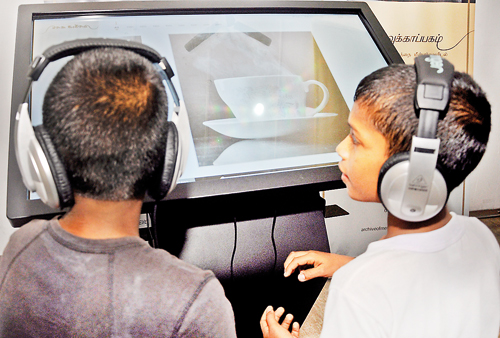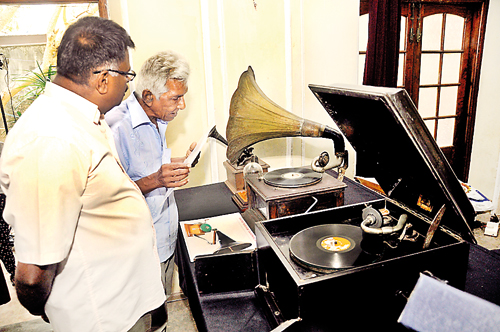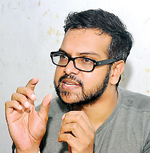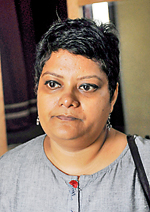It’s all about us: Keep an eye open for the travelling history museum

An interactive space: Visitors at the Travelling History museum. Pix by Ishanka Sunimal
The smell of incense, the taste of pol sambol, the feel of a teacup, the sight of beautiful pictures of Sri Lanka’s ancient martial arts and the sounds of children excitedly pressing buttons on a large computer screen were all part of ‘It’s About Time, A Travelling History Museum’. Organised by historicaldialogue.lk , the interactive museum took place from February 1 -10 at the Buddhist hall in Moratuwa.
The museum focused on events in the country from 1948 to 2018, and dealt with many important issues such as the war as well as the development of Sri Lanka’s technology. As you enter and leave each zone of the museum, a question is presented to you such as ‘History is complex? Do people’s stories matter?’ prompting visitors to think critically and ask questions.
“One of our main objectives is to allow the visitors to come into this space and experience something new. So basically, in Sri Lanka when you go into a museum space you have a certain idea of what a museum is like. In a baseline study we have conducted last year, we found that there are around 92 museums in Sri Lanka both government and private owned and we looked at how the narrative arc is curated, how items are displayed and we felt that there is a need to create a space which is more interactive,” says Sulakshana de Mel, one of the organisers.
 In ‘Ape Moratuwa I A Road Show’ by Chandraguptha Thenuwara, visitors could mark a life size map of Moratuwa and the Colombo area. Pins, tags and pen sat on a desk waiting for anyone to mark a special memory. The entire map was full of people, marking their home, and other places that have any significance to them. For example, “My family is buried here but I’m not allowed to be buried here after I die” pinned at St Emmanuel church. The history museum was being updated continuously as more and more people came in. It is a living museum in every sense of the word because as more people tagged momentous events, others could read it and understand their experiences.
In ‘Ape Moratuwa I A Road Show’ by Chandraguptha Thenuwara, visitors could mark a life size map of Moratuwa and the Colombo area. Pins, tags and pen sat on a desk waiting for anyone to mark a special memory. The entire map was full of people, marking their home, and other places that have any significance to them. For example, “My family is buried here but I’m not allowed to be buried here after I die” pinned at St Emmanuel church. The history museum was being updated continuously as more and more people came in. It is a living museum in every sense of the word because as more people tagged momentous events, others could read it and understand their experiences.
A teacup, a fish bun, a pair of spectacles and many other objects stood on stone pillars, and in front of them on the wall was a placard with a story. The ‘Archive of Memory 2018, Community Memorialisation Project’ tethered an event or a story of someone’s life with an object in the story and then displayed it. This also makes the story more memorable, especially since you are able to touch, feel or do anything with the object. In one of the stories, Kumaran left the house hurriedly to help a friend and was not able to drink his morning tea in his favourite tea cup gifted by his wife. He was subsequently never seen again, and a teacup displayed made the events of the story feel more real.

Nadeesh
One of the more interesting parts of the museum was the ‘Human Library’ which took place only at certain times. People who visited could borrow a ‘human’ and learn about their story. This allowed for more interaction as the reader could question and have a conversation rather than passively taking information.

Sulakshana
“Throughout my time in Canada I have had identity struggles, who am I? Am I Sri Lankan? Am I Canadian?” says Nadeesh Jayasinghe, one of the ‘books’ in the Human Library. He left Sri Lanka with his family when he was very young and recounts a significant event in his life when he was in high school and his identity as a Sinhalese was questioned in a society where the immigrants were largely Tamil. He didn’t understand the reaction, because he had no part in the ethnic conflict that was going on. He started looking into his history and eventually decided to move to Sri Lanka and devote his life to community service.
The museum was jampacked with many more interesting components, such as Her stories, which gives women a platform to tell their stories, an exhibit called Java Lane, an area vanishing with old Colombo, that talks about the lives of the people who lived there before it was razed to the ground, and Vaada Baila, which is a contest between baila singers. In addition, films such as Paangshu, Demons in Paradise and Thun Denek were screened.
The Travelling History museum has ended its Moratuwa run and will be moving to a new place so keep your eye open for its reappearance.


